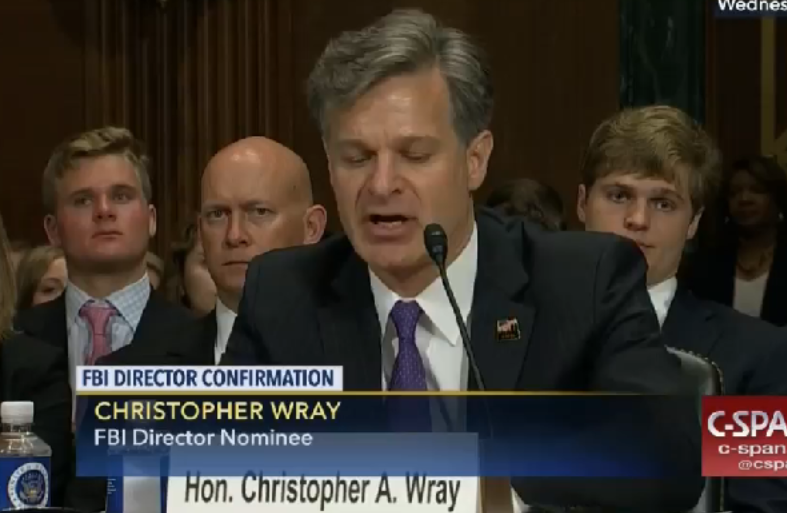Christopher Wray Departs from Jim Comey’s “Balance” on Encryption
In his statement before the House Judiciary Committee last week, FBI Director Christopher Wray raised encryption, as FBI Directors do when they go before Congress.
His comments on encryption have a really bizarre line, complaining that, “The more we as a society rely on electronic devices to communicate and store information, the more likely it is that information that was once found in filing cabinets, letters, and photo albums will now be stored only in electronic form.” The reverse is really the issue: our electronic devices now make it really easy to get and search through what previously might be hidden in a (locked!) filing cabinet. They also encourage us to write in texts what we used to say in phone or direct conversations. So the reality is all this digitalization just makes it easier to engage in one stop evidence shopping with someone’s phone.
The more interesting thing, to me, is the way in which Wray’s rhetoric deviates sharply from that of Jim Comey.
Comey, you’ll remember, always liked to talk about the “balance” between security and privacy. He used that formulation most times he discussed back doors in encryption.
And he gave an entire speech on it last year in the wake of the San Bernardino phone challenge.
In America we’ve always balanced privacy and security. It can be messy, it can be painful, but we’ve always worked through the three branches of government to achieve that balance in a sensible way.
[snip]
We have to find thoughtful, productive ways to talk about issues of privacy and security, and here’s the thing, by thoughtful I don’t mean that I’m right, and you’re wrong. I could be wrong about the way I assess, the way I perceive, the way I balance, the way I reason, but I think all productive conversations start from a place of humility. I could be wrong.
[snip]
[L]itigation is a terrible place to have any discussion about a complicated policy issue, especially one that touches on our values, on the things we care about most, on technology, on trade-offs, and balance.
[snip]
We are all people trying to do the right thing as we see the right. It is not for the FBI to decide how this country should govern itself.
It’s not for the FBI to decide what the right approach is here. Our job is to investigate. Our job is to tell you, the people who pay for us, when the tools you count on us to use aren’t working so much anymore, so you can figure out what to do about that. It’s also not the job of the technology companies to tell us—to tell you—what to do about this. Their job is to innovate and come up with the next great thing, and they’re spectacular at that, which is to be treasured. How we move forward needs to be resolved by the American people, and especially the young who know technology so well, and who care so deeply about getting the hard things right.
In his statement, Wray seems to be invoking this Comey formulation when he rejects the entire notion.
Some observers have conceived of this challenge as a trade-off between privacy and security. In our view, the demanding requirements to obtain legal authority to access data—such as by applying to a court for a warrant or a wiretap—necessarily already account for both privacy and security. The FBI is actively engaged with relevant stakeholders, including companies providing technological services, to educate them on the corrosive effects of the Going Dark challenge on both public safety and the rule of law, and with the academic community and technologists to work on technical solutions to this problem.
Wray appears to be rejecting Comey’s (usually false) show of seeking the right balanced between access and encryption, and instead saying a warrant is all it needs. That, in spite of the fact that Congress has specifically stopped short of requiring technical access for some of the applications that Wray and Comey were complaining about. Not to mention the fact that FBI doesn’t ever get a warrant to get to US person content via back door searches or the 2014 exception.
Ultimately, of course, the effect is the same: FBI is going to continue demanding back doors into encryption.
But Wray, apparently, doesn’t even feel the need to feign an interest in the debate.




Maybe because there really is no security or privacy in fact? And because of the back-door searching, whining about the time to get a warrant is, just whining.
The ‘Going Dark’ issue (not calling it a problem), is reality. The more IC spys, the more work goes into hiding from IC. To FBI, ‘Going Dark’ is a problem because it cuts into their parallel construction cash cow. But it does help the arguments for more money to build bigger and better haystacks which contain absolutely zero needles, which NSA is totally for.
Which is a tell that neither NSA nor CIA like FBI. Because budget money.
Eventually, the ‘Going Dark’ issue will become reality. IC will argue that the issue is so bad that the only solution is control the internet ala China. Maybe why Ajit Pai is in news.
Ultimately, the internet could end up balkanised, only working in individual countries to propogandize the population.
It is all about fascism and the love of money.
Until any TLA proves their worth, none can be trusted.
FSB and GRU are in the same dilemma.
I wish more public officials would emphasize the reality of the extinction of privacy in modern life. Once people comprehend that all electronic communications can be (and often are) monitored and recorded by both public and private entities, then forewarned is forearmed. It is a gross disservice to humanity to assist in the deception that private communication is protected and commonplace. End the charade and educate.
To add a European perspective: on 18 October 2017, the European Commission (EC) announced [0] an upcoming anti-terrorism package that addresses, inter alia, encryption challenges in criminal investigations. The Q&A [1] that came with the announcement states that the EC, following consultation “with Member States and stakeholders”, proposes:
* to support Europol to further develop its decryption capability;
* to establish a network of centres of encryption expertise;
* to create a toolbox for legal and technical instruments;
* to provide training for law enforcement authorities, supported by €500,000 from the ISF–Police fund in 2018;
* to establish an observatory for legal and technical developments;
* to establish a structured dialogue with industry and civil society organisations.
Note the last point: structured dialogue w/industry and civil society organisations (with unstated objectives). Compare that to Wray’s statement, cited in emptywheel’s post above, that “[…] The FBI is actively engaged with relevant stakeholders, including companies providing technological services, to educate them on the corrosive effects of the Going Dark challenge on both public safety and the rule of law, and with the academic community and technologists to work on technical solutions to this problem.” One could imagine that b/c the encryption topic is a trans-/multinational topic, the FBI and European agencies coordinate this along the lines of a joint information operations effort.
[0] http://europa.eu/rapid/press-release_IP-17-3947_en.htm
[1] http://europa.eu/rapid/press-release_MEMO-17-3982_en.htm